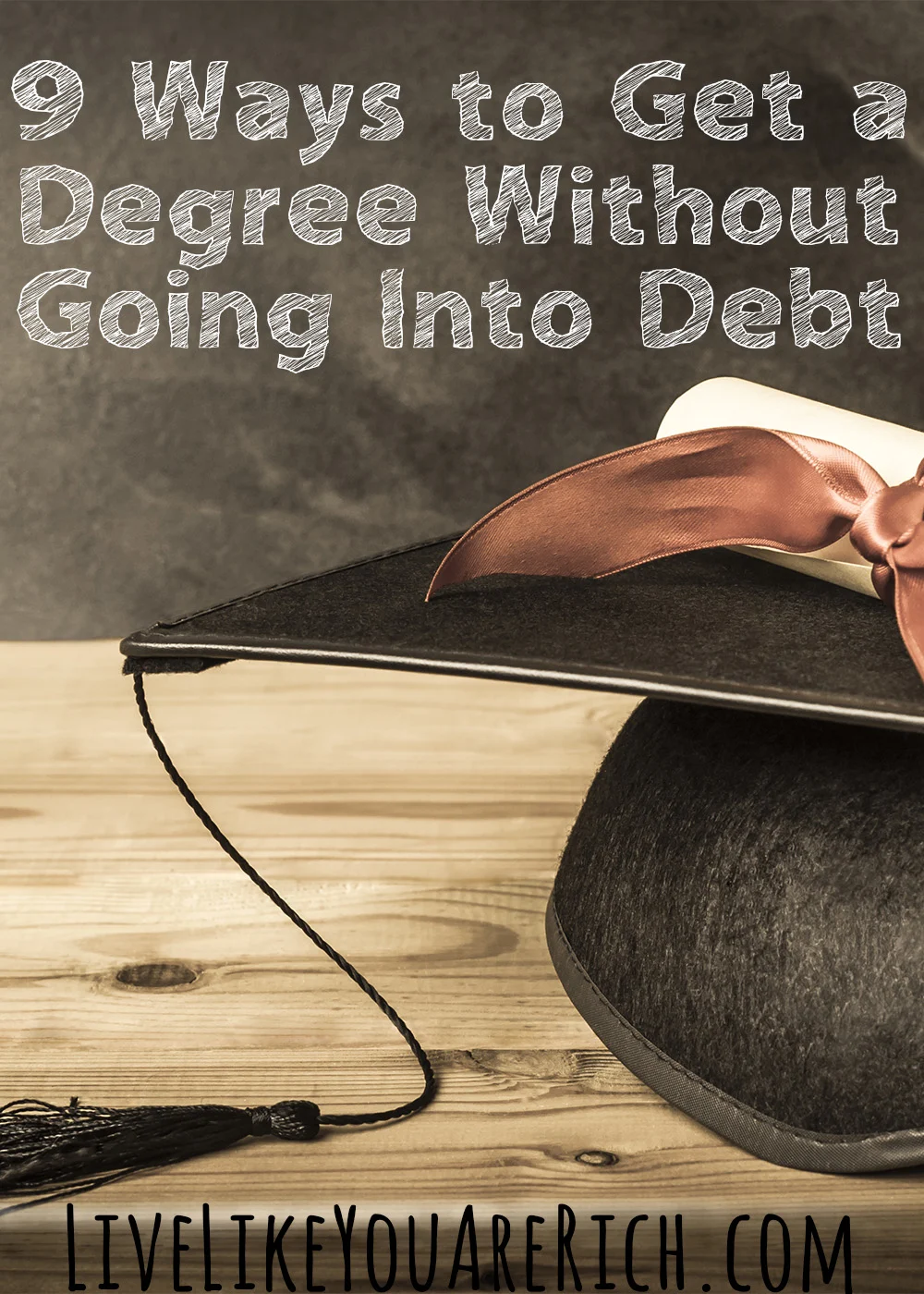I graduated with my bachelor’s degree at age 20 with zero debt. I didn’t have the help of any grants or scholarships. My parents stressed that us kids needed to work for and pay for every penny of our educations. Further, they made too much for us to get any kind of assistance. Thus, I had to get creative. I wanted to share what I did with you. So here are 9 ways to get a degree without going into debt.
1- Buy or rent your class books- When I took my first college course, I was shocked at the price of books. So, I drove to a used book store and was able to get them for almost 50% off! Universities and most colleges have also started selling used books in their book stores. Further, if you take good care of them, you can sell them back after your course is over. Buying used and selling them back saved me 60-80% on all my course books.
2- Find a job that makes working and studying possible (without employment theft)– I worked at GNC and studied after all my duties were done and there were no customers in the store. I also worked as a night-lifty at a local ski resort. I’d study on the bus ride up and down the canyon. I also studied if no one was using the lift and there wasn’t anything else that needed doing. I got hours of studying in a day while traveling to my job or while working.
I’ve seen a lot of college students studying in parking lot booths and other low-key jobs. Get creative, even if the pay is a little less, the study time is worth it.
3- Save up during the summer and/or school holidays- One summer I didn’t go to any school. I worked about 60 hours a week and saved up enough to pay upfront for my housing and tuition.
4- Take more credits- Most school tuition costs a certain amount for 12-15 credit hours, after that each additional course is SIGNIFICANTLY cheaper. My first semester I took 24 credits for 60% of the total price that I would have paid had I just taken 2 semesters. Because I wasn’t working during this semester and one of the classes was just the debate team, my University Dean was able to approve this high credit load. I just studied (and socialized a little) for the entire semester. Because my main focus was studying I was still able to get good grades. This is something that should only be done if you feel confident that you can complete the courses without a slip in grade point average.
5- Live at home-The last year of college I moved back home. I had just traveled to Taiwan (to teach English) and New Zealand (to snowboard) and was broke when I got back home. I also just wanted to get school done and I couldn’t afford another year away without going into debt. So I cut out the cost of housing and food (thanks mom and dad!) and was able to pay for my tuition.
6- Get on a monthly payment plan- My last year of my bachelor’s degree I worked the aforementioned jobs and was able to pay for books, tuition, etc. as I went along.
7- Get core requirements done on a college level and then transfer them to the University- Typically college courses are cheaper than University courses. I opted to get the majority of associates credits done at a smaller community college and then transferred them all to a university. Just make sure the courses will transfer directly to what you need them to before taking them.
8- Use coupons, shop wisely, and participate in inexpensive and/or free activities- Yes, I used some coupons in college. I also shopped a lot at Walmart, bought sale items, and cooked from home. Further, I ransacked my parents food storage whenever I came home for a visit (thanks again mom and dad!).
My friends and I were very good at finding free activities. We participated in: hikes, flag football, frisbee, kite flying contests, longboarding, skateboarding, etc. I had a BLAST! Our go-to activity was never going out to eat because we were all poor. College students can have good old fashion fun for free-they just need to get creative. Here is a beginners guide to coupons.
9- Go to school where you have residency to get in-state tuition- Although not always possible, instate tuition will save you considerably. I would recommend doing as many pre-requisite classes instate before going out of state for more specialized and expensive schooling. Also, if you can attain residency before going to school that will also save you considerably.
Bonus Tip 1: For high school students- Take as many concurrent enrollment classes, passable AP classes, and early college courses as possible- Early courses that can be taken in high school are much cheaper than taking the course on the college campus. My concurrent enrollment and AP class were only about $100 each which saved me thousands. Read about how to do that here.
Bonus Tip 2: My parents had too high of an income for me to qualify for any grants or assistance. So my main option for help was to get scholarships. I was on track to get a major scholarship but due to a misunderstanding I fell just short of it. Because this scholarship would have paid for the majority of my tuition for the next two years of school I was not actively applying for other options.
When it didn’t come through I was pretty devastated. I had to get a full time job and work 60 hours a week over the summer to make up for it. Had I been actively applying for other scholarships as well I would have most likely received a few other scholarships that would’ve helped me immensely. So try and apply for as many grants and scholarships as possible.
Here is a very popular article, I encourage you to read it if you are in Jr. High or High School and/or have kids who are. How to Get a Bachelors Degree by Age 20 with Zero Debt.
Despite not getting assistance doing these 9 things enabled me to get a degree without going into debt. By following them and applying for scholarships and grants, you could too.
For other ‘rich living’ and money saving tips please subscribe, like me on Facebook, and follow me on Pinterest.
SUBSCRIBE FOR OUR EMAILS




Jacalynn
Tuesday 21st of May 2019
Another thing to look into would be CLEP exams. Similar to AP courses, but for someone who has already left high school. There are free online courses to help you study for them. You can even watch the lectures at home after one of those sixty hr weeks.
Rachael
Monday 14th of March 2016
I joined the US military, sure I ended up being an older non-traditional student but while my friends have a lot of debt, I am debt free. Something I discovered while in college after the military is that there are plenty of colleges that offer their full time employees free tuition for a class or two per semester and free tuition for employees dependants which is how I plan on paying for my children's education in 8 years.
Anita Fowler
Friday 18th of March 2016
Great tip! Thank you. And thank you for your service.
FRIDAY ROUNDUP 4/10/2015 | GEN Y GIRL
Friday 10th of April 2015
[…] 4. 9 Ways to Get a Degree Without Going Into Debt: Live Like You’re Rich […]
Lisa @ The Wellness Wife
Wednesday 15th of October 2014
You are absolutely amazing. I wish more of today's youth were as personally and fiscally responsible as you.
Tuesday Links: Affording College On A Budget - Snail Pace Transformations
Tuesday 30th of September 2014
[…] 2. 9 Ways To Get A College Degree Without Going Into Debt by Live Like Your Are Rich […]